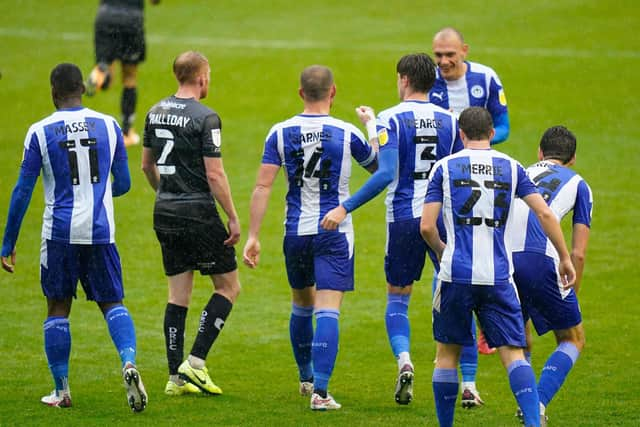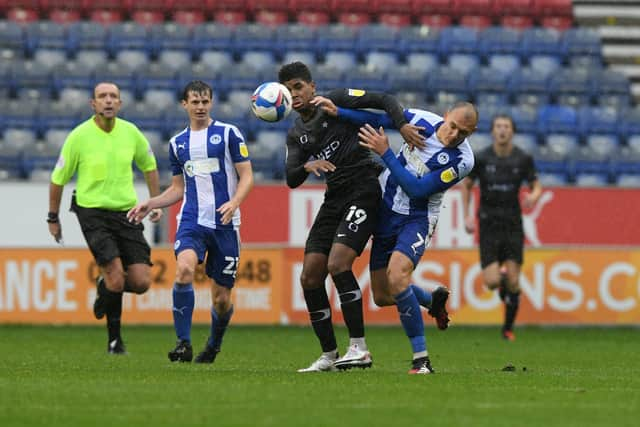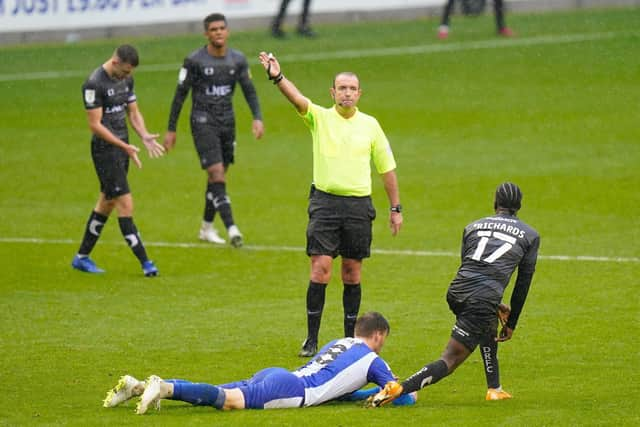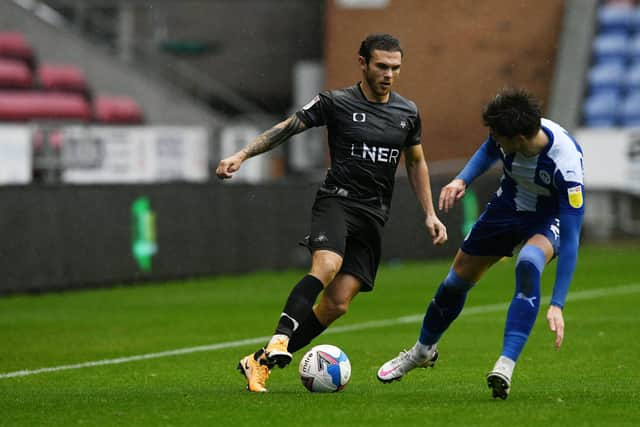It's goals that matter, keepers and full backs - Talking points as Doncaster Rovers lose their unbeaten record to Wigan Athletic
and live on Freeview channel 276
But there was very little in the way of gentleness about the manner in which Doncaster Rovers were delivered that message as they saw their unbeaten record in League One brought to an end.
Blunt, harsh but clear. You can play all the wonderful football you want but what matters is whether or not the ball ends up in the back of the net.
Advertisement
Hide AdAdvertisement
Hide AdEven when they were four goals to the good the previous week, manager Darren Moore had demanded more from his side. He called for them to discover a ruthless streak in front of goal.


And, as chances went begging in the pouring Lancashire rain, the value of Moore’s exacting standards was fully demonstrated.
Rovers had been outstanding for much of the first half when they moved the ball and worked spaces better even than they had produced previously in their strong start to the season.
But failing to convert at least one of their plethora of opportunities ensured they had no wiggle room to see them through when things got much, much tougher in the second half.
Advertisement
Hide AdAdvertisement
Hide AdThe defending and goalkeeping for Wigan’s solitary goal was certainly questionable. Moore labelled it a ‘basic, elementary’ goal as Joe Garner directed a header past a wrong-footed Josef Bursik to ultimately win the game with half an hour to play.


But that goal really should not have mattered had Rovers made their dominance count in the opening 45 minutes.
And so, as they head into a run of eight games in 28 days, Rovers know exactly where they are - and where they need to evolve further.
STORY OF THE GAME
As has been the trend so far this season, the game began at an electric pace, with the ball zipping around the sodden surface at the DW Stadium, which was battered by relentless rain throughout the day.
Advertisement
Hide AdAdvertisement
Hide Ad

But once Rovers got a grip on possession, they established control and played some superb football with captain Ben Whiteman dictating things from the middle of the park.
The ball was moved at pace, with minimal fuss and excellent accuracy to get Rovers up the pitch quickly.
They forced errors from the hosts’ nervy, makeshift back line and ensured they remained on the front foot for much of the opening period.
But their cohesion and the clinical edge to their play evaded them once they came within 20 yards of goal.
Advertisement
Hide AdAdvertisement
Hide Ad

Chances were snatched at, shots scuffed, the wrong option taken. The screw was not turned.
And it was never likely that Wigan boss John Sheridan would allow his side to be brushed aside with such ease in the second half.
The hosts emerged with a clear intent to deny Rovers the space they had relished in the first half and did a damn good job in putting that into practice.
Wigan had a stronger attacking drive and targeted Rovers with runs down the middle that put them on the back foot.
Advertisement
Hide AdAdvertisement
Hide AdAnd the supreme confidence with which Rovers had operated was washed away. They became scrappy, with poor first touches and slack passing.
It meant that when Garner nodded in Viv Solomon-Otabor’s cross on 59 minutes, that the task of getting back in the game looked beyond the visitors.
A side whose control of the game looked so easy in the first half were so easily beaten in the second.
A HARD ACT TO FOLLOW
The brilliance of Seny Dieng last season ensured it was inevitable that whoever followed in his wake would be under intense scrutiny.
Advertisement
Hide AdAdvertisement
Hide AdIn terms of his command of the area, superb footwork and distribution, the Swiss goalkeeper enjoyed a stunning season at Rovers.
And he left Bursik with a very tough act to follow.
The England U21 international has come in for plenty of criticism on social media so far this season, having not grasped the mantle in quite the manner of his predecessor.
There is little doubt that he could have done better for Wigan’s goal. His positioning as the ball came across to Garner meant he did not give himself the best opportunity to keep the header out, whichever direction it was sent.
And he seemed to anticipate it would go to his near post rather than back across goal, ensuring he was wrong-footed and unable to reset himself in time.
Advertisement
Hide AdAdvertisement
Hide AdBut much of the other criticism he has received has been more than a little harsh on a goalkeeper that has not had a tremendous amount to do over the opening four matches.
He has dropped very little, moved the ball quickly and showed his ability as a top shot stopper - particularly in denying Solomon-Otabor with his legs to keep the score on Saturday at 1-0.
FULL BACK OR FORWARD?
The positioning of Rovers’ full backs during attacks is a sight to behold.
Even when possession is collected on the edge of the area, both Reece James and Brad Halliday moved into the opposition half and pushed inside, ahead of Ben Whiteman and alongside the wide forwards.
Advertisement
Hide AdAdvertisement
Hide AdIt is bold but it gives Rovers tremendous presence in opposition territory and ensures there are always options open for a pass which, in turn, means the risk of committing so many men forward is low.
The understanding between the full backs and wide forwards is key too.
Halliday will cut inside to make room for Jon Taylor on the right while James was the one who typically went on the outside to allow James Coppinger to cut in.
As good as Rovers are when this approach is in full flow, they are also hampered when prevented from carrying it out.
Advertisement
Hide AdAdvertisement
Hide AdCloser attention from opposition teams, as they got in the second half on Saturday, pushes the full backs into a more defensive position and prevents Rovers from overloading in opposition territory.
*
Thank you to all who support local journalism with a print subscription.
The events of 2020 mean trusted, local journalism is more reliant than ever on your support.
We couldn't do it without you.
Please subscribe here https://www.localsubsplus.co.uk/ so we can keep campaigning on your behalf.
Stay safe.
Comment Guidelines
National World encourages reader discussion on our stories. User feedback, insights and back-and-forth exchanges add a rich layer of context to reporting. Please review our Community Guidelines before commenting.